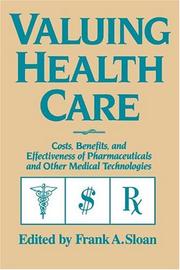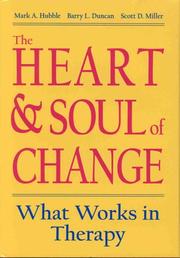| Listing 1 - 7 of 7 |
Sort by
|
Book
ISBN: 9781119536628 9781119536611 9781119536659 1119536626 Year: 2019 Publisher: Hoboken: Wiley-Blackwell,
Abstract | Keywords | Export | Availability | Bookmark
 Loading...
Loading...Choose an application
- Reference Manager
- EndNote
- RefWorks (Direct export to RefWorks)
Outside cover back : "Systematic reviews summarise primary research. They are central to the evidence- based medicine movement and are widely acknowledged as the best form of evidence on which to base healthcare decisions. The Cochrane Collaboration exists to produce systematic reviews of healthcare treatments. To be reliable, systematic reviews should be conducted to the highest level of scientific rigour. This book enables Cochrane and other systematic review authors to do this and to ensure their review is of the highest quality and avoid methodological pitfalls"--
Outcome and Process Assessment (Health Care) --- Evidence-Based Medicine --- Meta-Analysis as Topic --- Systematic Reviews as Topic --- methods --- Evidence-based medicine. --- Systematic reviews (Medical research) --- Outcome and Process Assessment, Health Care. --- Outcome and Process Assessment --- Outcome and Process Assessment, Health Care --- Information retrieval --- Theory of knowledge --- Philosophy of science --- General ethics --- Human medicine --- Cochrane Collaboration --- Evidence-Based Medicine - methods --- Systematic Reviews as Topic. --- Meta-Analysis as Topic. --- methods.
Book
ISBN: 9782919374243 2919374249 Year: 2019 Publisher: Brignais: le Coudrier,
Abstract | Keywords | Export | Availability | Bookmark
 Loading...
Loading...Choose an application
- Reference Manager
- EndNote
- RefWorks (Direct export to RefWorks)
Soigner comporte des risques pour les patients. Tous les professionnels de santé en font l'expérience, parfois de façon douloureuse. En ville, les évènements indésirables associés aux soins sont fréquents. Très peu, heureusement, ont des conséquences graves. En revanche, tous sont intéressants à étudier afin d'éviter qu'ils se reproduisent. Dans cet ouvrage, l'auteur expose la démarche à mettre en œuvre pour sécuriser les pratiques soignantes. À partir de situations vécues, il montre comment l'analyse systémique d'un évènement permet d'identifier tous les facteurs contributifs ; et explique de quelle manière définir des mesures préventives pertinentes. Enfin, il incite à mener ce travail à plusieurs, et de façon pluriprofessionnelle. Données épidémiologiques, outils méthodologiques et conseils pour réagir face à un évènement complètent le livre. Autant d'éléments qui intéresseront aussi bien les médecins, les pharmaciens et les infirmières que les autres soignants qui exercent en ville.
Outcome and Process Assessment, Health Care. --- Quality of Health Care --- Soins médicaux --- Relations personnel médical-patient. --- Évaluation des résultats et des processus en soins de santé. --- Qualité des soins de santé. --- Qualité --- Contrôle. --- Évaluation. --- Primary Health Care --- Health Services Administration --- Organization and Administration --- Health Personnel --- Outcome and Process Assessment, Health Care --- Quality of Health Care. --- Medical care --- Medical personnel and patient --- Quality Assurance, Health Care --- Professional-Patient Relations --- Urban Health Services --- Relations personnel médical-patient --- Évaluation des résultats et des processus en soins de santé. --- Qualité des soins de santé. --- Quality control --- Qualité --- Contrôle. --- Évaluation --- Évaluation médicale

ISBN: 052147020X 0521576466 0511625812 9780521470209 9780511625817 9780521576468 Year: 1996 Publisher: Cambridge : Cambridge university press,
Abstract | Keywords | Export | Availability | Bookmark
 Loading...
Loading...Choose an application
- Reference Manager
- EndNote
- RefWorks (Direct export to RefWorks)
As expenditure on health care has increasingly become an area of public debate and concern, public and private health care decision-makers have called for more rigorous use of cost-benefit and cost-effectiveness analysis to guide spending. Concerns have arisen, however, about the overall quality of such analyses. This book discusses and evaluates best-practice methods of conducting cost-benefit and cost-effectiveness studies of pharmaceuticals and other medical technologies. It encompasses a wide variety of topics, ranging from measuring cost and effectiveness to discounting to the use of dynamic modelling of cost-effectiveness. The book also includes conceptual and practical aspects of cost-effectiveness analysis by researchers who have conducted applied research in these areas. Rarely does the book provide a singular solution to a measurement problem; rather, the reader is directed to choices among alternative approaches and an analysis of the advantages and disadvantages of each.
Drugs --- Medical care --- Médicaments --- Soins médicaux --- Cost effectiveness --- Research --- Methodology --- Coût-efficacité --- Recherche --- Méthodologie --- Cost-Benefit Analysis --- Health Services --- Evaluation Studies --- Outcome and Process Assessment (Health Care) --- Economics, Pharmaceutical --- methods --- economics --- Médicaments --- Soins médicaux --- Coût-efficacité --- Méthodologie --- Health Care Economics and Organizations. --- Business, Economy and Management --- Economics --- Social costs. Social benefits --- Hygiene. Public health. Protection --- Pharmacotechnology. Preparations --- Medical care - Cost effectiveness - Research - Methodology --- Cost-Benefit Analysis - methods --- Health Services - United States --- Outcome and Process Assessment (Health Care) - economics - United States --- Economics, Pharmaceutical - United States --- Drugs - Cost effectiveness - Research - Methodology --- Methodology. --- Health Care Economics and Organizations --- Medicaments --- Medications --- Medicine (Drugs) --- Medicines (Drugs) --- Pharmaceuticals --- Prescription drugs --- Bioactive compounds --- Medical supplies --- Pharmacopoeias --- Chemotherapy --- Materia medica --- Pharmacology --- Pharmacy --- Delivery of health care --- Delivery of medical care --- Health care --- Health care delivery --- Health services --- Healthcare --- Medical and health care industry --- Medical services --- Personal health services --- Public health --- Cost benefit analysis --- Health --- economics.

ISBN: 9780335199648 033519964X 0335199658 Year: 1998 Publisher: Buckingham [England]: Open university press,
Abstract | Keywords | Export | Availability | Bookmark
 Loading...
Loading...Choose an application
- Reference Manager
- EndNote
- RefWorks (Direct export to RefWorks)
W 84 Health services. Quality of health care (General) --- Evaluation Studies as Topic --- Outcome and Process Assessment (Health Care) --- Evaluation --- Medical Care --- Medical care - Evaluation --- Outcome and Process Assessment, Health Care. --- Evaluation Studies. --- Medical care --- Soins médicaux --- Evaluation. --- #SBIB:316.334.3M50 --- Donabedian Model --- Donabedian Triad --- Outcome and Process Assessment --- Structure Process Outcome Triad --- Model, Donabedian --- Triad, Donabedian --- Critique --- Evaluation Indexes --- Evaluation Methodology --- Evaluation Report --- Evaluation Research --- Methodology, Evaluation --- Pre-Post Tests --- Qualitative Evaluation --- Quantitative Evaluation --- Theoretical Effectiveness --- Use-Effectiveness --- Critiques --- Effectiveness, Theoretical --- Evaluation Methodologies --- Evaluation Reports --- Evaluation, Qualitative --- Evaluation, Quantitative --- Evaluations, Qualitative --- Evaluations, Quantitative --- Indexes, Evaluation --- Methodologies, Evaluation --- Pre Post Tests --- Pre-Post Test --- Qualitative Evaluations --- Quantitative Evaluations --- Report, Evaluation --- Reports, Evaluation --- Research, Evaluation --- Test, Pre-Post --- Tests, Pre-Post --- Use Effectiveness --- Organisatie van de gezondheidszorg: algemeen, beleid
Book
ISBN: 9780470699515 0470699515 0470057963 9780470057964 047071218X 9786611939472 1281939471 0470712171 Year: 2008 Publisher: Chichester: Wiley-Blackwell,
Abstract | Keywords | Export | Availability | Bookmark
 Loading...
Loading...Choose an application
- Reference Manager
- EndNote
- RefWorks (Direct export to RefWorks)
The Cochrane Handbook for Systematic Reviews of Interventions (formerly the Reviewers' Handbook) is the official document which describes in detail the process of creating Cochrane systematic reviews.
Evidence-Based Medicine --- Meta-Analysis as Topic --- Outcome and Process Assessment (Health Care) --- Review Literature as Topic --- State-of-the-Art Reviews --- State-of-the-Art Review --- Review, State-of-the-Art --- Reviews, State-of-the-Art --- State of the Art Review --- State of the Art Reviews --- Donabedian Model --- Donabedian Triad --- Outcome and Process Assessment --- Structure Process Outcome Triad --- Model, Donabedian --- Triad, Donabedian --- methods --- Overviews, Clinical Trial --- Clinical Trial Overviews --- Data Pooling --- Clinical Trial Overview --- Data Poolings --- Meta Analysis as Topic --- Overview, Clinical Trial --- Evidence-based medicine --- Medicine --- Meta-analysis --- Outcome assessment (Medical care) --- Assessment of outcome (Medical care) --- Outcome evaluation (Medical care) --- Outcome measures (Medical care) --- Outcomes assessment (Medical care) --- Outcomes measurement (Medical care) --- Outcomes research (Medical care) --- Patient outcome assessment --- Medical care --- Psychometrics --- Social sciences --- Clinical sciences --- Medical profession --- Human biology --- Life sciences --- Medical sciences --- Pathology --- Physicians --- EBM (Medicine) --- Evidence-based healthcare --- Clinical medicine --- Systematic reviews (Medical research) --- Clinical Trials as Topic --- Statistics as Topic --- Models, Statistical --- Methodology --- Research&delete& --- Evaluation --- Research --- Statistical methods --- Decision making --- Meta-Analysis as Topic. --- Meta-analysis. --- Outcome and Process Assessment (Health Care). --- Outcome assessment (Medical care). --- Review Literature as Topic. --- methods. --- Methodology. --- Evaluation. --- #SBIB:303H0 --- #SBIB:303H12 --- Methoden in de sociale wetenschappen: algemeen --- Methoden en technieken: sociale wetenschappen --- Quantitative methods in social research --- Human medicine --- evidence-based methodiek --- Cochrane Collaboration --- Philosophy of science --- General ethics --- Theory of knowledge --- Meta-Analysis. --- WB 102 Clinical medicine --- Handbooks --- Review --- Special queries --- Médecine factuelle --- Médecine --- Evaluation des résultats (Soins médicaux) --- Méthodologie --- Recherche --- Health Workforce --- Outcome and Process Assessment, Health Care. --- Evidence-based medicine - Methodology. --- Medicine - Research - Evaluation. --- Evidence-Based Medicine - methods. --- Outcome and Process Assessment, Health Care
Book
ISBN: 2718414251 2718414227 9782718414225 9782718413921 2718413921 9782718414256 Year: 2016 Publisher: Montrouge: Arnette,
Abstract | Keywords | Export | Availability | Bookmark
 Loading...
Loading...Choose an application
- Reference Manager
- EndNote
- RefWorks (Direct export to RefWorks)
Présentation de l'éditeur : "La chirurgie ambulatoire se développe de façon considérable depuis quelques années. Elle est le reflet conjugué des progrès techniques et médicaux qui réduisent les interventions invasives permettant au malade un retour à domicile en 24 à 48 heures et des impératifs économiques qui tendent à écourter les séjours à l'hôpital. D'un abord extrêmement pratique et concis, ce petit ouvrage rédigé par les plus grands responsables d'unités de chirurgie ambulatoire décrit l'ensemble des aspects liés à l'organisation des soins en amont et en aval d'une intervention, à l'hôpital et à domicile"
Ambulatory surgery. --- Day care surgery --- Day surgery --- In-and-out surgery --- Office surgery --- Outpatient surgery --- Same day surgery --- Surgery, Outpatient --- Ambulatory medical care --- Hospitals --- Surgery --- Surgical clinics --- Outpatient services --- Same-day surgery --- Ambulatory Surgical Procedures. --- Chirurgie ambulatoire. --- Ambulatory surgery --- Procédures de chirurgie ambulatoire. --- Évaluation des résultats et des processus en soins de santé. --- Permanence des soins. --- After-Hours Care. --- Outcome and Process Assessment, Health Care. --- Administration. --- Ambulatory Surgical Procedures --- Continuity of Patient Care --- Process Assessment (Health Care)

ISBN: 155798557X 9781557985576 Year: 1999 Publisher: [Place of publication not identified] American Psychological Association
Abstract | Keywords | Export | Availability | Bookmark
 Loading...
Loading...Choose an application
- Reference Manager
- EndNote
- RefWorks (Direct export to RefWorks)
Therapy is a profession under assault. Perhaps more than any time before, payers, consumer groups and legislators are putting what therapists do under the closest of scrutiny. Within the field itself, and especially among different theoretical schools, quarrels and contentious claims continue unabated. Various factions cast their model and their techniques as superior to the rest. Joining manualized therapy and protocol-driven interventions, so-called experimentally established therapies represent the latest campaign for a "technically correct" standard of care. One former president of the American Psychological Association was right: Therapy is being industrialized, as are virtually all who practice it. At the root of many controversies currently surrounding therapy is the important question of what works. Is efficiency based on the singular curative powers of specialized techniques or do other variables account for patient change? This book proposes the answer, which is not to be found in different languages, theories or procedural differences. Instead, the answer lies in common factors - the ingredients of effective therapy shared by all orientations. More than 40 years of outcome research is pointing the way to what really matters in the therapist's day-to-day work. The editors have assembled some of the best researchers and practitioners in the field today. Through their efforts, findings from multiple perspectives - clinical, research, quantitative and qualitative evidence, individual and family therapy, medical and school psychology, and, finally, a broad range of theoretical orientations - are bridged. The result is a book that provocatively interprets the empirical foundation of how people change in a scholarly yet accessible manner. Clinicians will especially appreciate the wealth of practical suggestions for employing the common factors in their daily practice.
#PBIB:2000.2 --- #KVHB:Psychotherapie --- #KVHB:Psychiatrie --- Strategic therapy --- Differential therapeutics --- Mental Disorders --- Treatment Outcome --- Decision Making --- Psychiatry --- Psychotherapy --- therapy --- methods --- Psychagogy --- Therapy (Psychotherapy) --- Differential therapeutics in psychiatry --- Mental illness --- Clinical sociology --- Mental health counseling --- Treatment --- Methodology --- Outcome Assessment (Health Care) --- Thinking --- Prognosis --- Behavioral Disciplines and Activities --- Behavioral Sciences --- Psychiatry and Psychology --- Medicine --- Diagnosis --- Outcome and Process Assessment (Health Care) --- Mental Processes --- Health Occupations --- Quality of Health Care --- Disciplines and Occupations --- Analytical, Diagnostic and Therapeutic Techniques and Equipment --- Psychological Phenomena and Processes --- Health Care Evaluation Mechanisms --- Health Services Administration --- Health Care Quality, Access, and Evaluation --- Health Care --- Health & Biological Sciences --- Mental Disorders - therapy --- Psychiatry - methods --- Psychiatry - Differential therapeutics --- Psychotherapy. --- Strategic therapy. --- Outcome Assessment, Health Care. --- Thinking. --- Prognosis. --- Behavioral Disciplines and Activities. --- Behavioral Sciences. --- Medicine. --- Diagnosis. --- Outcome and Process Assessment, Health Care. --- Mental Processes. --- Health Occupations. --- Mental Disorders. --- Treatment Outcome. --- Decision Making. --- Psychiatry. --- Quality of Health Care. --- Health Care Evaluation Mechanisms. --- Health Services Administration. --- Health Care Quality, Access, and Evaluation. --- Delivery of Health Care. --- Differential therapeutics.
| Listing 1 - 7 of 7 |
Sort by
|

 Search
Search Feedback
Feedback About UniCat
About UniCat  Help
Help News
News